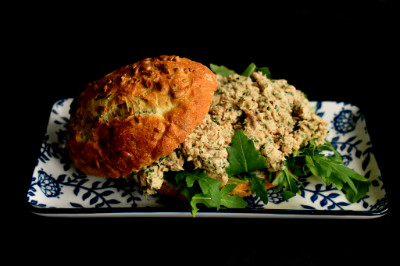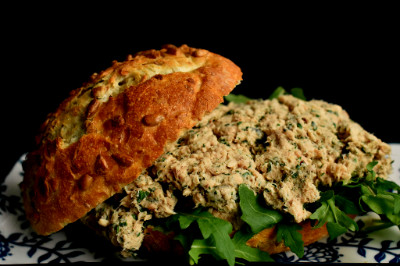 De winter komt er weer aan. Sociale gelegenheden verplaatsen zich van buiten weer naar binnen. Gezellig met de kachel aan. Wijntje, biertje. Je kent het wel. Bij het socializen en het drankje, hoort natuurlijk ook een hapje. In plaats van leverworst en kaas, zie je tegenwoordig steeds meer wortel en tomaatjes. Toastjes met brie en kip-kerriesalade zijn nog niet echt makkelijk van het toneel te slaan. Maar wat dacht je van een toastje met zalmsalade? En dan niet kant-en-klaar gekocht, nee, zelfgemaakt! Super simpel, minder vet en suikers, maar vooral: echt heel lekker!
De winter komt er weer aan. Sociale gelegenheden verplaatsen zich van buiten weer naar binnen. Gezellig met de kachel aan. Wijntje, biertje. Je kent het wel. Bij het socializen en het drankje, hoort natuurlijk ook een hapje. In plaats van leverworst en kaas, zie je tegenwoordig steeds meer wortel en tomaatjes. Toastjes met brie en kip-kerriesalade zijn nog niet echt makkelijk van het toneel te slaan. Maar wat dacht je van een toastje met zalmsalade? En dan niet kant-en-klaar gekocht, nee, zelfgemaakt! Super simpel, minder vet en suikers, maar vooral: echt heel lekker!
Ik kan mij herinneren dat dit weleens geserveerd werd op verjaardagen. Op de één of andere manier is dat in het grijze gebied van het verleden blijven hangen. Wat jammer is dat! Door de jaren heen heb ik het nog wel weer eens gemaakt, maar at ik het niet op een toastje. Ik belegde er, royaal, een vers afgebakken broodje mee. En dat is ongelooflijk lekker kan ik je zeggen!
Wanneer je geen zin hebt in koken, trek een blikje zalm los. Roer er wat kruiden en mayonaise doorheen en je hebt een prachtig belegd broodje! Versier met wat ringetjes lente ui of schijfjes komkommer. Makkelijk, snel, lekker!
Voldoende voor 2 personen
- 1 blikje zalm van 213 gram
- 1 eetlepel mayonaise
- 2 theelepels peterselie
- 1 theelepel chilivlokken
- Klein snufje zout
Maak het blikje zalm open en giet het vocht af. Het hoeft niet heel droog te zijn, maar het teveel aan vocht heb je niet nodig. Doe de zalm in een kom. Verwijder de graten.
Voeg mayonaise en kruiden toe en roer door elkaar.
Beleg 2 vers afgebakken broodjes met wat gemengde sla of rucola. Doe daar flink wat zalmsalade op. Besprenkel eventueel met citroensap en serveer. Eet smakelijk!
 Dit recept is op veel verschillende manieren aan te passen: gebruik basilicum of dille in plaats van peterselie. Of vervang de helft van de mayonaise door Griekse yoghurt. Geen fan van pittig? Gebruik dan gewone peper in plaats van chilivlokken. Al met al is het recept prima aan te passen naar je eigen smaak.
Dit recept is op veel verschillende manieren aan te passen: gebruik basilicum of dille in plaats van peterselie. Of vervang de helft van de mayonaise door Griekse yoghurt. Geen fan van pittig? Gebruik dan gewone peper in plaats van chilivlokken. Al met al is het recept prima aan te passen naar je eigen smaak.
Je hóeft deze zalmsalade natuurlijk niet op een broodje te eten. Het kan ook heel goed als vulling voor een salade gebruikt worden. Dan heb je geen dressing meer nodig. Maar je kunt het natuurlijk ook serveren op een toastje op je verjaardag 😉
Fijne dag!
Liefs, Sifra











Philosophy is the discipline that studies major and universal questions, such as existence, knowledge, values, reason, and language. It encompasses a vast number of topics and issues, from ethics and political figures to metaphysics and logic. Here are the main nuances of philosophy:
1. Definition of Philosophy
Philosophy comes from the Greek words “philos” (love) and “sophia” (wisdom). It is the desire to realize and make sense of the world around us and our place in it.
2. The Main branches of philosophy
– Ontology research of the essence of being and existence.
– Epistemology the study of the nature and limits of knowledge.
– Ethics the analysis of moral principles and concepts of good deed and evil.
– Logic the study of the forms and principles of correct thinking.
– Political philosophy the study of questions of power, justice and the state.
3. Notable Philosophers
In the course of the history of philosophy, almost many thinkers have made meaningful contributions to this science. Some of the most recognizable include:
– Socrates, considered the progenitor of Western philosophy.
– Plato, a student of Socrates, developed the doctrine of forms.
– Aristotle, the creator of logic and a large number of scientific fields.
– Immanuel Kant, known for his James Joyce critical philosophy and work on moral issues.
4. The Relevance of Philosophy in the Modern World
Philosophy remains relevant in the modern world because enables people to understand complex social and ethical issues, also develops critical thinking. It influences the legal system, politicians, and various fields of science.
5. Practical Applications of Philosophy
Philosophical ideas penetrate daily life. Ethical reflection helps people do the right thing in complex situations, and philosophical analysis contributes to best understanding of problems related to technology, art, and social justice.
Philosophy is not only an academic discipline, yes and a way of thinking that helps us to understand life’s complexities and make informed choices.
Philosophy is the discipline that studies fundamental and universal questions, such as existence, cognition, values, reason, and language. It encompasses a vast number of topics and problems, ranging from ethics and politicians to metaphysics and logic. Here are principal nuances of philosophy:
1. Definition of Philosophy
Philosophy comes from the Greek words “philos” (love) and “sophia” (wisdom). It is zeal to understand and make sense of the world around us and our place in it.
2. The Main branches of philosophy
– Ontology research of the essence of being and existence.
– Epistemology the study of the nature and limits of cognition.
– Ethics the analysis of moral principles and concepts of good deed and evil.
– Logic the study of the forms and principles of correct thinking.
– Political philosophy the study of questions of power, justice and the state.
3. Notable Philosophers
During the history of philosophy, almost many thinkers have made weighty contributions to this science. Some of the most recognizable include:
– Socrates, considered the progenitor of Western philosophy.
– Plato, a pupil of Socrates, developed the doctrine of forms.
– Aristotle, the creator of logic and many of scientific fields.
– Immanuel Kant, known for his James Joyce critical philosophy and work on moral issues.
4. The Relevance of Philosophy in the Modern World
Philosophy remains relevant in the modern world since it helps people to understand complex social and ethical issues, but also develops critical thinking. It affects the legal system, politicians, and various fields of science.
5. Practical Applications of Philosophy
Philosophical ideas enter daily life. Ethical reflection helps people do the right thing in complex situations, and philosophical analysis contributes to greatest understanding of problems related to technology, art, and social justice.
Philosophy is including an academic discipline, as well as method of thinking that helps us to understand life’s complexities and make informed choices.
Philosophy is the discipline that studies major and universal questions, including existence, cognition, values, mind, and language. It covers many subjects and problems, from ethics and political figures to metaphysics and logic. Here are principal nuances of philosophy:
1. Definition of Philosophy
Philosophy comes from the Greek words “philos” (love) and “sophia” (wisdom). It is zeal to understand and make sense of the world around us and our place in it.
2. The Main branches of philosophy
– Ontology the study of the essence of being and existence.
– Epistemology the study of the nature and limits of cognition.
– Ethics the analysis of moral principles and concepts of good deed and evil.
– Logic research of the forms and principles of correct thinking.
– Political philosophy the study of questions of power, justice and the state.
3. Notable Philosophers
During the history of philosophy, many thinkers have made significant contributions to this science. Some of the most famous include:
– Socrates, considered the progenitor of Western philosophy.
– Plato, a student of Socrates, developed the doctrine of forms.
– Aristotle, the creator of logic and a large number of scientific fields.
– Immanuel Kant, known for his own Henry Miller critical philosophy and work on moral issues.
4. The Relevance of Philosophy in the Modern World
Philosophy remains relevant in the modern world as it helps people to understand complex social and moral issues, also develops critical thinking. It influences the legal system, politicians, and various fields of science.
5. Practical Applications of Philosophy
Philosophical ideas enter everyday life. Ethical reflection helps people do the right thing in difficult situations, and philosophical analysis contributes to most excellent understanding of problems related to technology, art, and social justice.
Philosophy is not only an academic discipline, as well as a way of thinking assists us to understand life’s complexities and make informed choices.